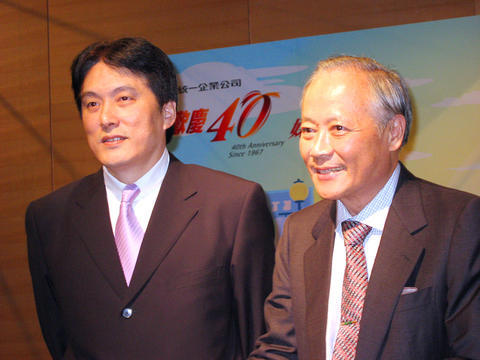Uni-President Enterprises Corp (統一企業), the nation's biggest food conglomerate, yesterday celebrated its 40th anniversary by setting a goal of becoming a market leader in Asia in the next decade.
"[Now that we have built] a solid foundation, Uni-President's strength lies in its diversification [from the food and beverage sector into service-oriented businesses such as channeling, retailing and branding]," executive president Alex Lo (羅智先) said in Kaohsiung. "[We] have the potential to outcompete other Asian players in the next 10 years."
Lo was speaking at the company's Dream Mall (

PHOTO: JOYCE HUANG, TAIPEI TIMES
In May, Lo said Uni-President aimed to best Asian competitors outside Japan within three years through acquisitions in China and India.
To outdo top-tier Japanese competitors, Uni-President Group's annual combined revenues, which reached NT$258 billion (US$7.93 billion) last year, will have to exceed the NT$400 billion level in the years to come.
Founded in August 1967, Uni-President started as a flour importer in southern Tainan's Yongkang City with an initial capital of NT$30 million. The company's capital has since grown to NT$33.5 billion and in late June the board targeted a further increase to NT$48 billion in the near future.
Uni-President employs more than 60,000 people and owns 7 brands with annual sales of NT$1 billion each as well as more than 40 brands with annual sales exceeding NT$100 million each.
With an eye on the future, the company has invested about US$350 million in China since 1992.
China contributes nearly 51 percent of the group's food business revenues, although Uni-President lags behind Taiwanese competitor Ting Hsin International Corp (頂新集團) in that market -- particularly in the instant noodle sector.
"China is a giant market. We will gradually expand our share [in the market] by increasing our investments and through mergers and acquisitions," Lo said.
While the company is bullish on China, Uni-President Group chief executive officer Jason Lin (
Value-added products sell in Taiwan, where GDP per capita is relatively high, but fail to satisfy Chinese consumers, who favor products of quantity and size with low prices.
For example, Uni-President's “Left Bank Coffee” brand had not gone down well in China, Lin said.
The company had previously said it planned to follow the lead of 50 of its Taiwanese peers by listing on the Hong Kong stock market by the end of the year. But Lo yesterday refused to reveal a timetable for the move, saying
only that “the market will decide whether we go public in Hong Kong, Bangkok or Singapore.”
Lo said that Uni-President's 40th anniversary theme was “Life of Value Evolution” (LOVE) and that the company would focus on branding and the four pillars of trade, distribution, manufacturing and strategic alliances.
“Our main goal is to facilitate a happier, better and richer life for all our customers,” he added.
Uni-President shares yesterday rose by NT$0.5, or 1.06 percent, to close at NT$47.7 on the Taiwan Stock Exchange. The stock has risen by 59.54 percent over the last 12 months.

Intel Corp chief executive officer Lip-Bu Tan (陳立武) is expected to meet with Taiwanese suppliers next month in conjunction with the opening of the Computex Taipei trade show, supply chain sources said on Monday. The visit, the first for Tan to Taiwan since assuming his new post last month, would be aimed at enhancing Intel’s ties with suppliers in Taiwan as he attempts to help turn around the struggling US chipmaker, the sources said. Tan is to hold a banquet to celebrate Intel’s 40-year presence in Taiwan before Computex opens on May 20 and invite dozens of Taiwanese suppliers to exchange views

Application-specific integrated circuit designer Faraday Technology Corp (智原) yesterday said that although revenue this quarter would decline 30 percent from last quarter, it retained its full-year forecast of revenue growth of 100 percent. The company attributed the quarterly drop to a slowdown in customers’ production of chips using Faraday’s advanced packaging technology. The company is still confident about its revenue growth this year, given its strong “design-win” — or the projects it won to help customers design their chips, Faraday president Steve Wang (王國雍) told an online earnings conference. “The design-win this year is better than we expected. We believe we will win

Chizuko Kimura has become the first female sushi chef in the world to win a Michelin star, fulfilling a promise she made to her dying husband to continue his legacy. The 54-year-old Japanese chef regained the Michelin star her late husband, Shunei Kimura, won three years ago for their Sushi Shunei restaurant in Paris. For Shunei Kimura, the star was a dream come true. However, the joy was short-lived. He died from cancer just three months later in June 2022. He was 65. The following year, the restaurant in the heart of Montmartre lost its star rating. Chizuko Kimura insisted that the new star is still down

While China’s leaders use their economic and political might to fight US President Donald Trump’s trade war “to the end,” its army of social media soldiers are embarking on a more humorous campaign online. Trump’s tariff blitz has seen Washington and Beijing impose eye-watering duties on imports from the other, fanning a standoff between the economic superpowers that has sparked global recession fears and sent markets into a tailspin. Trump says his policy is a response to years of being “ripped off” by other countries and aims to bring manufacturing to the US, forcing companies to employ US workers. However, China’s online warriors